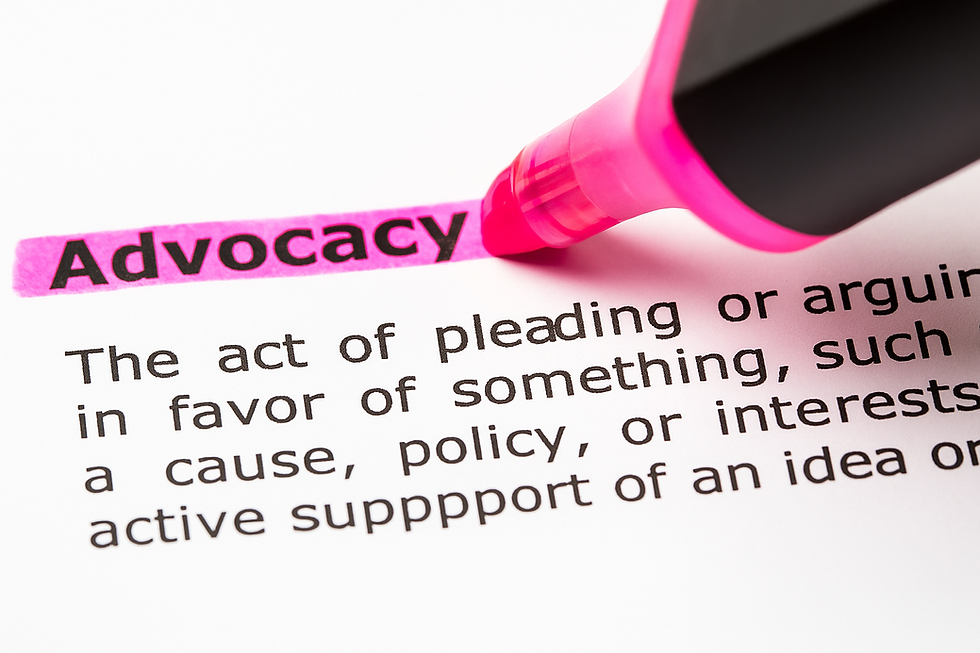What Is an Advocate, and Why Having One Can Make All the Difference
- Deborah Marks
- Jul 29, 2025
- 3 min read
What Is an Advocate?
In the context of mental health and therapy, an advocate is someone who supports, speaks up for, or stands beside another person, especially when that person may feel overwhelmed, uncertain, or unheard.
An advocate can be a trusted friend, a family member, a therapist, or a professional trained in advocacy. Their role is not to take over, but to walk alongside you. They help make your voice stronger when it might feel faint, and they help ensure your needs, rights, and choices are respected.
Advocates are especially important when navigating systems or situations that can feel intimidating, such as medical settings, mental health care, school environments, or government services.

Why Having an Advocate Matters in Therapy and Mental Health
Mental health challenges can be isolating. Whether you are facing anxiety, depression, trauma, neurodivergence, grief, or stress, having someone who sees and supports you without judgment can be profoundly grounding.
Here’s how an advocate can make a meaningful difference:
1. They help you feel heard
Sometimes, people struggle to articulate what they’re going through. A good advocate helps clarify your needs, feelings, or requests, especially during times when communication is difficult. They may attend appointments with you, help you prepare questions, or even speak on your behalf when requested.
2. They provide emotional backup
Therapy often stirs up deep emotions. Having someone who understands your journey and offers consistent encouragement can build emotional safety. You are reminded that you are not alone in the process.
3. They reduce feelings of helplessness
An advocate can help you feel more in control of your treatment, decisions, and future. By ensuring your choices are understood and respected, they foster empowerment, not dependence.
4. They can challenge systems and support fairness
In situations where your mental health has affected your ability to access fair treatment, such as in the workplace, school, or legal settings, advocates can help ensure your rights are upheld. They often know the system and can help you navigate it with more confidence.
Who Can Be an Advocate?
There’s no one-size-fits-all answer. The best advocate for you is someone you trust, who listens well, and who puts your needs first. That could include:
A close friend or family member
A support worker or case manager
A psychologist or therapist in a professional support role
A community advocate trained in mental health systems
If you are seeing a therapist, they can also support you in learning self-advocacy skills. These include how to ask for what you need, how to set boundaries, and how to communicate effectively under stress.
Learning to Be Your Own Advocate
While external advocates can be powerful allies, building self-advocacy is a valuable therapeutic goal. It involves learning to:
Trust your voice and experiences
Set healthy boundaries
Speak up about your needs and values
Ask for help without guilt or shame
Challenge unhelpful narratives about yourself
In therapy, we work with clients to develop these skills gently and intentionally. You don’t need to have all the answers, and you don’t need to do it alone. But with support, many people discover they are far more resilient and capable than they realised.
Final Thoughts
Whether you're navigating a new diagnosis, facing difficult decisions, or just beginning to explore therapy, having an advocate can make the path feel less daunting. You deserve to be supported, seen, and respected. Advocacy, whether from someone else or from within yourself, can be a quiet yet powerful force for healing.
If you’re seeking support in your mental health journey, reach out to a therapist who understands the value of advocacy and works alongside you with compassion and respect.
Need Support?
At Hope Prevails, we are here to support your voice and your healing. Whether you're looking for a safe space to talk, build confidence, or find clarity, you are welcome here.
Contact Us Today - Let’s take the next step together.



Comments